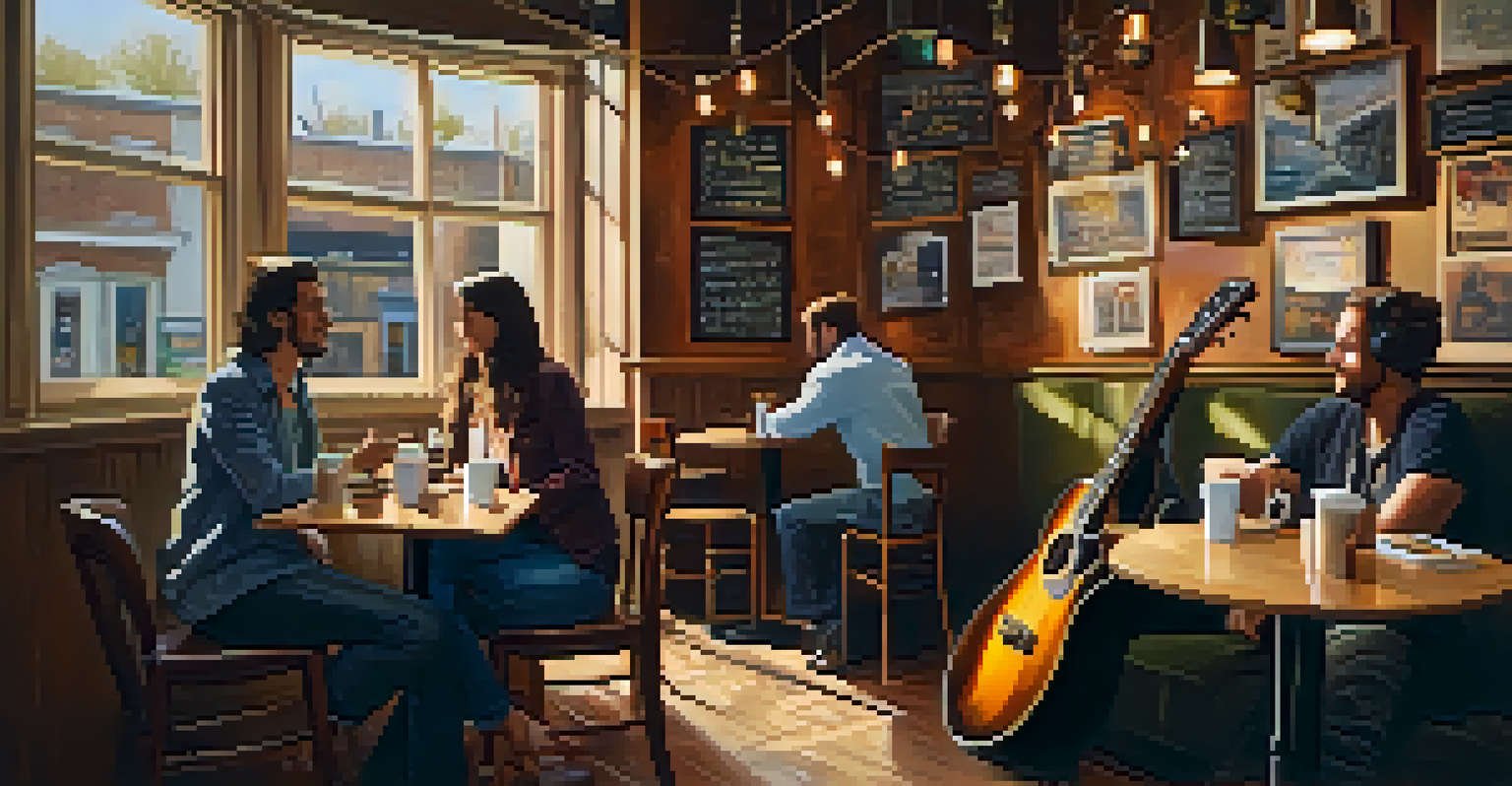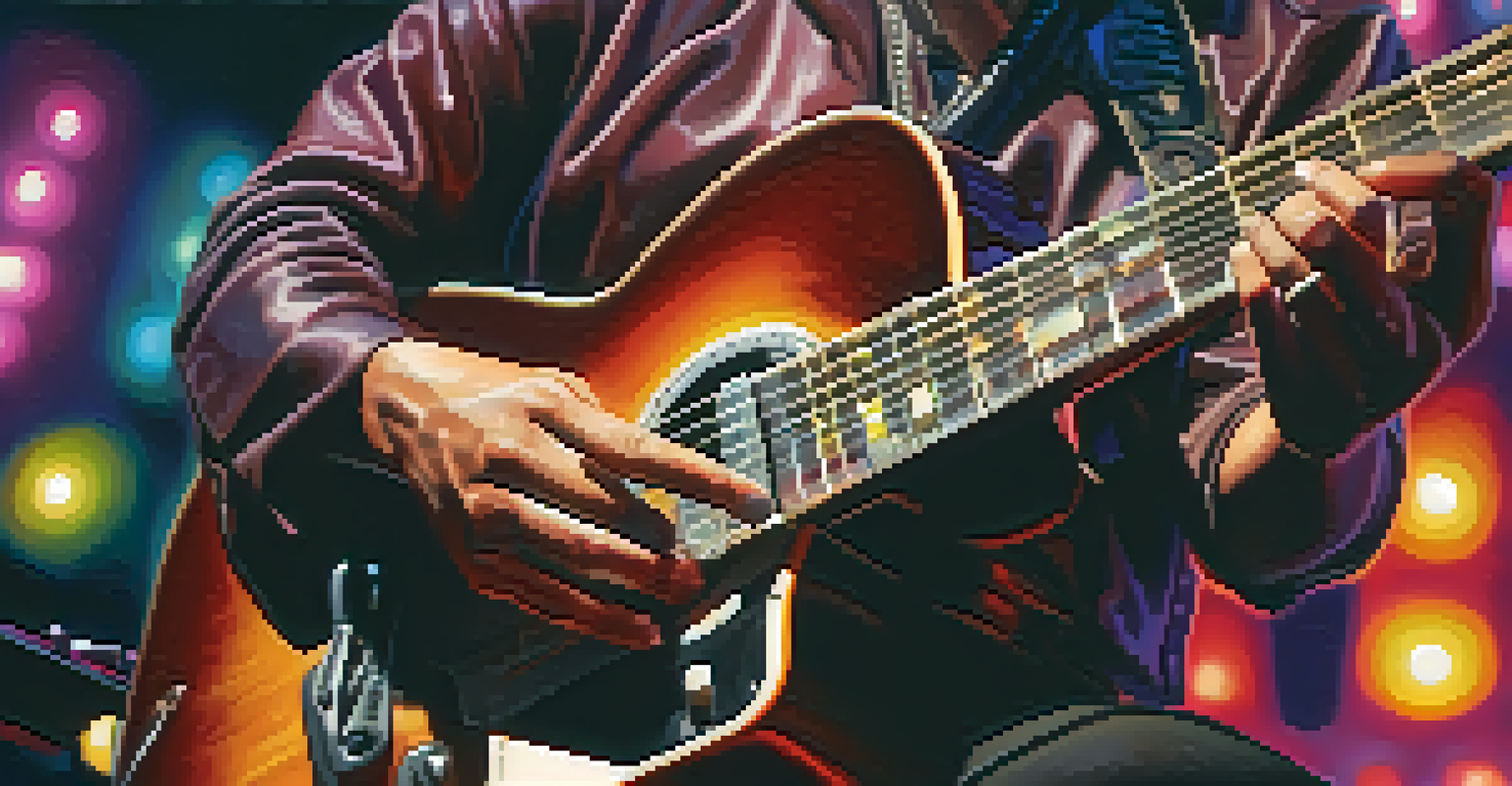The Importance of Networking in the Music Industry for Guitarists

Understanding Networking and Its Value in Music
Networking in the music industry refers to building relationships that can lead to opportunities, collaborations, and guidance. For guitarists, this means connecting with other musicians, producers, and industry professionals who can help elevate your career. Think of it like tending to a garden; the more you nurture your connections, the more likely they are to bloom into fruitful opportunities.
It’s not what you know, it’s who you know.
When you network effectively, you're not just promoting yourself; you're also learning from others. Each musician has their own journey and experiences, and tapping into that knowledge can provide insights that are invaluable. These interactions can inspire your music, influence your style, and even help you navigate the complexities of the industry.
Moreover, networking can lead to gigs, recordings, and collaborations that might not be available otherwise. In a competitive field like music, having a solid network can set you apart and create pathways to success that you may not have discovered on your own.
Building Authentic Relationships with Fellow Musicians
One of the most rewarding aspects of networking is the chance to build genuine friendships with fellow musicians. Whether it’s sharing a stage or jamming together, these experiences can forge deep connections that go beyond the surface. Remember, it's not just about what others can do for you; it's important to think about what you can offer them as well.

Consider attending local gigs, open mic nights, or music festivals not just to perform, but to meet others in the scene. Engaging in conversations and showing interest in others' work can create a lasting impression. It's like finding your musical tribe, where support and encouragement flow both ways.
Networking Boosts Music Opportunities
Building relationships in the music industry opens doors to gigs, collaborations, and valuable insights.
As you cultivate these relationships, they're likely to evolve into collaborations, referrals, and opportunities down the line. Authentic connections can lead to powerful partnerships that enhance your artistic journey and help you grow as a guitarist.
Leveraging Social Media for Networking Success
In today's digital age, social media platforms are invaluable tools for networking. They allow you to connect with musicians and industry professionals from around the world, all from the comfort of your home. Platforms like Instagram, Facebook, and Twitter can be powerful for showcasing your talent and engaging with your audience.
Your network is your net worth.
By sharing your music, insights, and experiences, you can attract like-minded individuals and build a community. Don't shy away from reaching out to others in your field; a simple message expressing admiration for their work can go a long way. It's akin to striking up a conversation at a coffee shop – you never know where it might lead!
Moreover, participating in online discussions, joining musician groups, and attending virtual events can expand your network significantly. Just remember to keep your interactions genuine and respectful; building a reputation for being approachable and friendly will make others more likely to engage with you.
The Role of Networking in Finding Performance Opportunities
Networking plays a crucial role in discovering performance opportunities, whether it's local gigs, festivals, or tours. Often, these chances arise through word-of-mouth or personal connections rather than traditional applications. When you’re in the loop, you’re more likely to hear about openings before they’re even advertised.
Consider connecting with venue owners, booking agents, and fellow musicians who can refer you when opportunities arise. Just like a spider weaving its web, the more connections you make, the more chances you have to catch gigs. Each performance not only hones your skills but also introduces you to new audiences and potential collaborators.
Social Media Enhances Networking
Utilizing social media platforms allows musicians to connect, share talents, and foster meaningful relationships globally.
Additionally, participating in open mics or jam sessions can help you showcase your talent while expanding your network. These informal settings often lead to unexpected performance opportunities and can significantly boost your visibility in the local music scene.
Networking for Collaboration and Creative Growth
Collaboration is a powerful aspect of networking that can lead to creative growth and fresh musical ideas. When you connect with other musicians, you open doors to new sounds, styles, and genres. Collaborating can inspire you to push your boundaries and explore different facets of your artistry.
Think about how many iconic songs were born out of collaborations. Artists often come together to create something greater than the sum of their parts, and as a guitarist, you can benefit from this synergy. By aligning with musicians who complement your style, you can produce unique pieces that stand out in the crowded music landscape.
Moreover, collaborative projects can also enhance your visibility and credibility in the industry. By working with established artists, you can tap into their fan base and gain exposure that may have taken years to build on your own.
Networking as a Source of Mentorship and Guidance
Another significant benefit of networking is the potential for mentorship. Experienced musicians often have valuable insights to share, and building relationships with them can provide guidance as you navigate your musical journey. A mentor can offer advice, share industry secrets, and help you avoid common pitfalls.
Consider reaching out to musicians you admire and asking for advice or insights about their experiences. Many are willing to share their stories and might even appreciate your initiative. It's like having a map in an unfamiliar city; their guidance can help you find your way more effectively.
Mentorship Fuels Artistic Growth
Establishing connections with experienced musicians can provide guidance, support, and expand your network.
Additionally, mentorship relationships often lead to further networking opportunities. A mentor might introduce you to their contacts, broadening your own network and opening more doors in your career.
Overcoming Networking Challenges in the Music Industry
Networking can sometimes feel daunting, especially for introverted musicians or those new to the industry. It's easy to feel overwhelmed in a room full of established artists, but remember that everyone starts somewhere. Taking small steps can help ease the discomfort and gradually build your confidence.
Start by setting realistic networking goals, such as attending one event a month or reaching out to one new person a week. These manageable targets can help you stay motivated and make the process feel less intimidating. Just like learning a new song on the guitar, practice makes perfect!

Additionally, don’t underestimate the power of online networking. If in-person events feel overwhelming, connecting with others through social media or virtual meetups can be a great alternative. The key is to be open, authentic, and willing to engage; over time, you'll find your rhythm in the networking landscape.